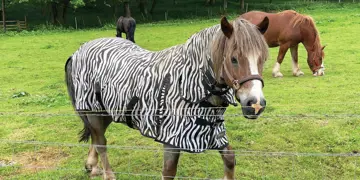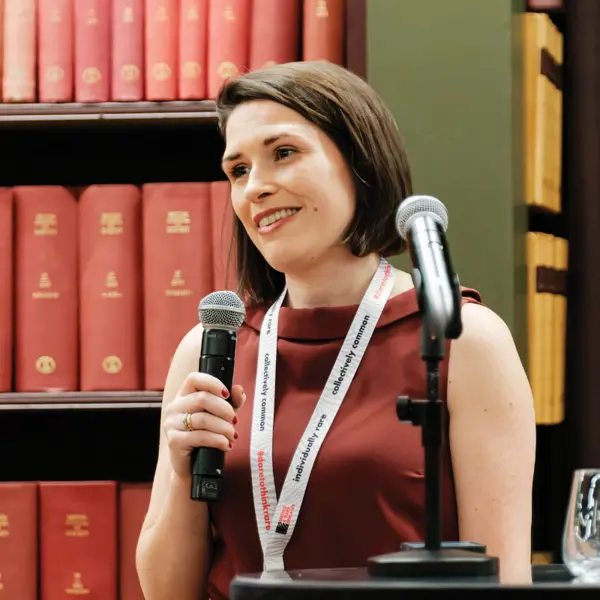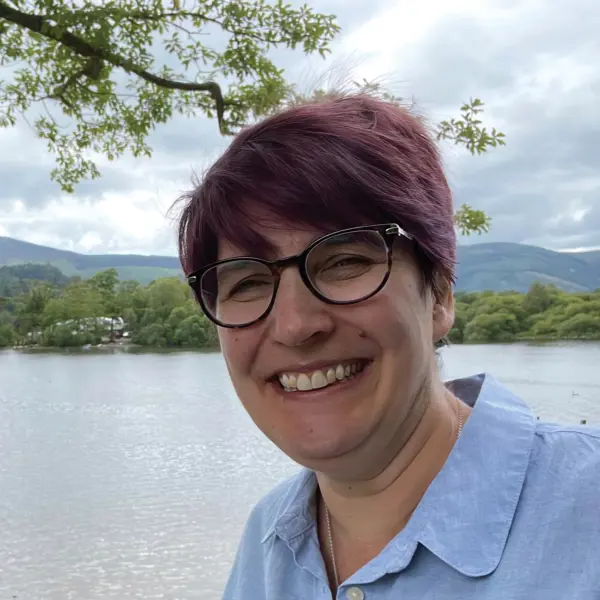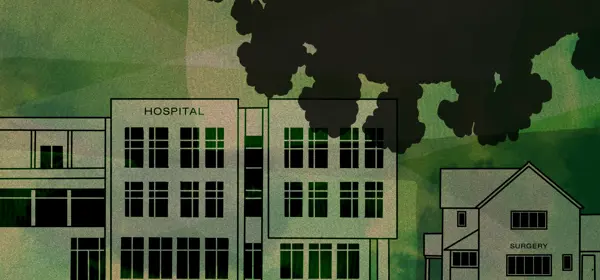Finding the zebra
Finding the zebra
Diagnosis has to rely to an extent on playing the odds – ‘common things are common’. But this means patients with rare diseases can often go years before finding out what is wrong with them. How can we improve at spotting the zebras among the horses?
Beth Meek was a healthy 40-something, juggling roles as a GP partner, prison doctor and clinical lead in her Sussex clinical commissioning group.
Then, she slipped on a water slide and began to feel unwell: pulsatile tinnitus in one ear and a persistent worsening headache. Her condition was first diagnosed as migraine but tests later showed she had had TIAs (transient ischaemic attacks) caused by bilateral carotid artery dissections.
She recovered but, seven years later in 2022, she began to feel seriously unwell; bloods indicated a heart attack.
Owing to her medical history, she urged her doctors to consider coronary artery dissections as the cause – something she had learnt about on a Facebook group. One consultant told her: ‘Coronary arteries don’t dissect.’ Another reminded her of the guidelines: it was more likely to be ‘normal’ heart disease.
Three hospitals later, she was referred to a cardiologist specialising in rare conditions and diagnosed with SCAD (spontaneous coronary artery dissection). Two years on, she is still off work, still recovering.
There’s an element of chance as to who you see and what their experience has been
Dr Meek
Dr Meek had become one of those worst-case scenarios every GP fears – the rare occasion where odd symptoms turn out to be a rare condition, a ‘zebra’ not a ‘horse’.
‘I was able to advocate for myself and push to have a referral to the right clinics,’ she says.
‘But I know I practised medicine as “common things are common”, and I would have been horrified if a patient came to me with something they had learnt on Facebook.
‘But to some extent this is how medicine works: there is an element of chance as to who you see and what their experience has been.’
‘Denied existence’
Lucy McKay and her organisation M4RD (Medics 4 Rare Diseases) are committed to ensuring chance plays no part in whether rare conditions are diagnosed or not.
Her older brother died of a rare genetic condition as a child: her parents were heavily involved in advocacy and fundraising for research and clinical trials.
Yet, at medical school, she found rare and genetic conditions were taught as curios. ‘The message was: “You won’t see them, common things are common, there’s nothing you can do about it anyway,”’ says Dr McKay.
‘I’d sit in our pathology museum, surrounded by people with rare conditions, or at least bits of them in jars, all of whom had contributed to our medical knowledge, yet in my medical education, their existence was being denied.’
One of the mantras of M4RD, which she co-founded while at medical school, is that rare diseases are ‘individually rare but collectively common’. They affect an estimated 3.5 million people in the UK.
Yet, too many people living with a rare disease are condemned to a ‘diagnostic odyssey’, a grand tour of different specialists and services which takes on average four to six years to reach diagnosis, says M4RD. Most rare conditions are multi-system and lifelong.
‘In the UK you can’t be referred between specialists,’ says Dr McKay. ‘So you go from GP to specialist, to GP, to specialist, until someone joins the dots and suspects an underlying condition.’
The latest available figures suggest the diagnostic odyssey costs NHS England £340m a year. The burden on primary care, where GPs are left to care for patients with as yet unexplained symptoms without support, is immense.
And the human cost of delay is incalculable, says Dr McKay. Early diagnosis is key to slowing progression in many rare conditions; some metabolic conditions can be fatal if undiagnosed.
‘And the mental health impact is huge: you’re likely to experience denial of your symptoms, denial of your lived experience, not being listened to, and long periods of uncertainty.’
Probabilities
GPs are often blamed for ‘missing’ rare conditions, but that isn’t fair, says Dr McKay. Without robust rare disease education and training, and without knowing about the resources available to them, the odds are stacked against GPs in the zebra-spotting game.
About 70 per cent of rare conditions emerge in childhood; 80 per cent are genetic. The UK Newborn Screening Programme tests for nine conditions in the UK; many European countries screen for more than 20.
Paediatric surveillance of health is minimal too, Dr McKay points out. Unlike in many European countries, children in the UK do not have routine checks to monitor their development and flag risks or difficulties at an early stage. So, when a patient presents with a ‘problem’, the GP often has little prior clinical information to go on.
Systemic pressures compound the problem, says Dr Meek. There is little time for thorough investigations of patient histories, although medical summarisers supported GPs in her practice. Double or triple appointments were rarely feasible, continuity of care almost impossible. She and her colleagues prioritised shared learning and collaborating on cases, but that dwindled in busy times.
To a point, though, general practice has always had to bet on horses while negotiating the risk of an occasional zebra. Exploring low probabilities costs time and money.
‘You want to rule out the important things, the heart attack, the stroke, but spotting underlying conditions is really difficult,’ says Dr Meek.
So you go from GP to specialist, to GP, to specialist, until someone joins the dots
Dr McKay
‘I was lucky, in a diagnostic sense, there was no missing my symptoms. But I just couldn’t put it all together, my colleagues didn’t, and my GP couldn’t either. And I don’t in any way blame them.’
Her own health crisis has made her more alert to rare conditions – but has also shaken her confidence.
‘Once or twice, after my TIAs, I admitted a patient with similar symptoms and said to the medics on call, “I’m wondering if it could be a carotid artery dissection.” One once said, “Why on earth would you think that?” And I had to say, “Because it’s the right symptoms and because I’ve had it.” You can’t say you’re never going to come across a case. It does worry me a lot, if I do go back to work, how I will manage that uncertainty.’
Diagnostic tools
Unlike Dr Meek, blues musician David Hick felt his health deteriorating gradually, over years.
He had had fatigue and painful muscular spasms as a child, but doctors were unconcerned: he was ‘just tall and skinny’. Or ‘lazy’. By his early 20s his mental health had deteriorated sharply: ‘I felt like I just wasn’t good at certain things, which really affected my confidence.’
It was a physio treating Mr Hick for a back injury who contacted his GP who referred him to a neurologist. Finally, last year, aged 35, Mr Hick was diagnosed with Becker muscular dystrophy. ‘I’d never heard of muscular dystrophy before,’ he says. ‘It felt like a grenade had gone off near me: I couldn’t hear a thing.’
He is now supported by a specialist neuromuscular centre in Newcastle and a patient community through Muscular Dystrophy UK; he’s also involved in a clinical trial.
But is it inevitable people such as Mr Hick with slow-onset or wide-ranging symptoms must wait so long for diagnosis? Dr McKay insists not.
She recognises GPs ‘are trying to work with their hands tied behind their back’, with ever less time and resource available and little or no dedicated rare disease training in undergraduate or postgraduate curricula. But even ‘suspecting a rare disease’ is a good first step, she says.
The current diagnostic tools for rare conditions such as FindZebra ‘require doctors to have considered rare disease in the first place’, she says. Yet, M4RD surveys consistently find doctors underestimate how prevalent rare diseases are. The European Commission defines a ‘rare disease’ as one which affects fewer than one in 2,000 people.
M4RD’s approach is to consider rare disease a distinct discipline of medicine in which patients face a common set of challenges, owing to the low prevalence of their conditions. The charity provides free rare-disease training for doctors and medical students on its M4RD Learn platform. The first module, ‘Rare disease 101’, takes less than an hour to complete.
Recent research by Dr McKay identifies seven ‘red flags’ common to many rare conditions – and they’re not necessarily biomedical. As well as more obvious flags such as multiple specialist referrals and misdiagnoses, the list includes ‘multi-system involvement (three or more)’ and ‘difficulties at school’.
‘The patient is not going to say, “I’ve got one major congenital anomaly and two minor ones. And if you notice, my urea is always slightly high.” But if you have a five-year-old whose file is considerably bigger than their sibling’s, treat the sibling as the control and take the big file as potentially “something going on underneath”.’
You can’t say you’re never going to come across a case
Dr Meek
M4RD also offers a range of training and tools to help healthcare professionals learn about specific conditions, as well as signposting other sources of support and information, from Orphanet to the National Genomics Education Programme’s GeNotes.
However, Dr McKay insists doctors can develop a gut feeling for rare disease, a gestalt that helps them see patterns.
‘It’s not about suspecting a rare disease in every patient. But if there is diagnostic uncertainty, then consider an underlying rare disease and check for “red flags”.’
Knowing where and how to refer patients with suspected rare disease is another challenge. Dr Meek could draw on the support of medical secretaries to help with researching options, but it took time.
Patient advocacy groups typically have online resources and events to help doctors learn about specific conditions and make referrals.
For example, MDUK (Muscular Dystrophy UK), which supports Mr Hick, offers free online courses and upskilling webinars for healthcare professionals. It has also developed regional neuromuscular networks whose aim is to connect GPs and the wide range of community services used by people living with muscle-wasting and muscle-weakening conditions, with specialist services in their region. They facilitate networking and sharing of best practice, as well as identifying service gaps or challenges to be addressed.
And some specialists are involved in outreach. The Atkinson Morley Neuromuscular Centre at St George’s Hospital in London, for example, actively liaises with GP practices to try to identify patients with neuromuscular conditions who are not known to them, to help them access specialist support.
Yet, for all this, it is still very much the role and remit of patient advocacy groups and charities such as MDUK to make these connections. MDUK even finds itself advising ICBs (integrated care boards) in England on which specialist services for which rare conditions ICBs now have direct commissioning responsibility for.
Too many GPs and patients are still struggling to manage conditions without support, says MDUK director of campaigns, care and support Rob Burley.
‘Our Centre of Excellence Awards recognise great examples of partnership, of specialists reaching out into local services,’ he says.
The issue has been people not admitting they don’t know. Just say if you don’t know and look it up
Dr Meek
‘But we do still find people who are still being looked after by their GP, either because they don’t have a diagnosis, or they don’t feel the need to go to a specialist centre.
‘Neuromuscular conditions cover an incredibly wide range of rare and progressive conditions, and the diagnosis journey is complex. It’s therefore crucial that we improve the understanding and knowledge of non-neuromuscular specialist healthcare professionals to ensure the referral process is efficient – as well as the coordination of support and ongoing condition management.’
Humility
Dr Meek is now a patient ambassador for M4RD, using her story to impress on others the need to take rare conditions seriously. She hopes to get involved in GP training schemes in Cumbria, where she now lives.
What she has learnt as a patient is the need for doctors, including herself, to have humility. She got her SCAD diagnosis when a consultant cardiologist at a Sussex teaching hospital had the grace to admit his ignorance and contact a specialist in Leicestershire.
‘Throughout my journey the issue has been people not admitting they don’t know. Just say if you don’t know and go look it up. And we need to be advocates for our patients who have got weird symptoms that just don’t fit together.’
For Dr McKay, it’s a question of fairness: despite the UK Rare Diseases Framework and associated action plans in all four UK nations, there remain huge health inequalities around rare conditions.
Things will not change until rare disease becomes about people, not statistics, she says.
‘Since the first UK Rare Disease Strategy in 2013, there has been a lot of public resource dedicated to health science innovation such as artificial intelligence for analysing big data, genomics and gene therapy,’ says Dr McKay. ‘But I am not convinced that people with rare conditions and their families are feeling the relative benefit.
‘Current rare-disease training tends to focus on biochemical detail. We need to concentrate on the people impacted. Rare is a number but it is also an experience. This experience can be made far more manageable with a safety net of understanding and compassionate individuals involved in their care.’






